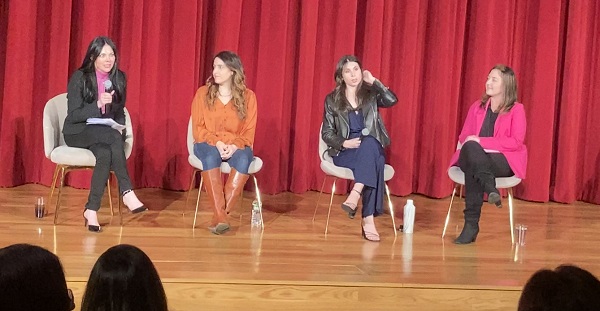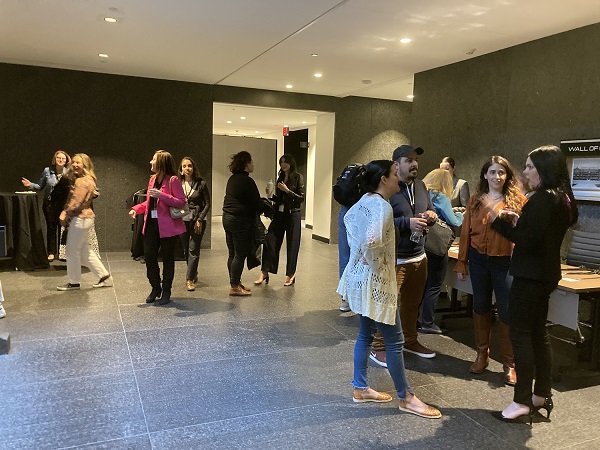NJ Women in Tech Forum Panelists Advise Women on How to Get into the Room Where It Happens
[A follow-up to this event will take place virtually on LinkedIn Live today, May 10, at 1PM here.)
NJTechWeekly.com attended the inaugural Women in Tech forum event at Bell Works (Holmdel), as we were interested in comparing this discussion with other “women in tech” events we’ve covered.
One striking difference: The panelists were, for the most part, no longer only talking about the hindrances to their rise to the top, but also how they figured out solutions that made their careers work. They were eager to transfer their knowledge to the 60-plus members of the audience.
The April 20 meeting was hosted by NextTech Communications (Holmdel) and TechUnited:NJ (Jersey City), and featured plenty of networking opportunities both before and after the panelists spoke. The panel included Jenna Gaudio, COO of Vydia (Holmdel); Jasmine Ward, VP of strategy & operations at TechUnited:NJ; and Amanda Pietrocola, president and CEO of Momentum Technology (Holmdel); it was moderated by Janine Savarese, CEO of NextTech.
How to Get Invited to Important Meetings
Gaudio discussed how, at one of her jobs, men were neglecting to invite her to important meetings that affected how she could do her work. Sometimes the meetings would be about projects she was supposed to be running. “I did try to finagle my way into the room. I wasn’t always welcome. And I don’t think it was malicious in any way. I wasn’t just an afterthought, I wasn’t a thought at all.”
Her solution was to convince one person that she needed to be at the meetings, and when meetings were held without her, he’d say something like “Jenna’s not here and I think she could be valuable. Let me go grab her.” Gaudio continued, “That was when I realized that I could influence the situation for my own good and for the good of others, and that was going to be an absolutely necessary skill set, which changed what my trajectory looked like.”
Pietrocola, who has been in tech her entire career, said that when she was in her twenties and she was the only female in the room, she would think, “I’ve made it to the boys club.” It didn’t register that this was wrong, that there should have been more women in the room. She recalled that sometimes she would be speaking, and a guy would just start talking over her “like I wasn’t even speaking.”
As she continued in the field, she felt comfortable telling men who talked over her that she wasn’t done sharing her thoughts yet, but she did so respectfully. She didn’t believe that the men had any malicious intent; they just tended to be more aggressive than the women. “And I think, when we match [their aggression] in a very respectful way, but make it known ‘Hey, I still have a voice. I was still speaking,’ I have found that the men in that room have appreciated that and respect it.”
Underestimation, the Young Woman’s Superpower
According to Ward, young women in the tech industry face a double whammy due to their gender and age. Ward produced her first tech conference in New York City at the Javits Center when she was just 21, and she found that everyone underestimated her. And when people underestimate you, “you have to play it to your advantage,” she told the audience. “As soon as people underestimate you, you have to ask yourself ‘how do I make this work for me?’”
She recalled that, at that event, people frequently ignored her role as a leader or assumed that her role there was a junior one. When she received a few questions that none of the men were apparently getting, she knew that she had to push forward and stake her claim as a player and leader in the space, while retaining the more relevant parts of her role. Ward added, “If you have a question about the economics of this event, or where I think the startup community is going to be [in the future], I’m happy to help you with those questions or relationships.” You just have to own it, she advised.
How to Close the Gender Gap
Savarese asked the group “What tactic or new strategy would you want to implement over the next couple of years, short or long term, that you think will help close the gender gap?”
Ward said that closing the gender gap actually begins with the hiring and sourcing process. “To me, that’s figuring out the inherent bias that’s in the writing of job descriptions, and also the writing and coding of the technology that a lot of companies use to sort through applications using AI [artificial intelligence] or using other technologies that pick up key words or contextual information.” She added, “I do think there is a big opportunity to really look at the way in which we are writing and promoting and leveraging data, or technology, or even just the way we are going out to the market to bring in a more diverse candidate pool.”
Gaudio said that at her company communications goes a long way towards closing the gender gap. “I think when you work in a really good team, and you’ve worked with really good people, and you’re trying to work with different perspectives, there’s going to be differences of opinions and handling of things differently than one would want. The way that you solve that is educating each other on how we’re going to be treated, and how we’re going to go to a meeting together, and how we’re going to present ideas, and figuring out who should be in that meeting, and why they should be in that meeting, and what is the impact of their meeting. And I think that helps close the gender gap in all sorts of ways.”
Referring to the pay gap that still plagues women in the workplace, she said, “I really think people are talking about pay way more — women, obviously, and people of color, especially because there’s such a discrepancy. But also in states like New York, they’re saying you have to post when you’re recruiting … about what the salary is, which stirs whole other conversations around making things visible and transparent. So policies are going to force us that way. And, as human beings, we should be heading in that direction voluntarily anyway.”
Pietrocola said that, at Momentum, “we’ve actually coined the term ‘care-frontation.’” This is about “confronting a person because you care about that person, and you don’t want to have divisions in that working relationship.” For example, someone could say, “What you said was offensive” or “I don’t understand why this happened.” A lot of us weren’t raised with healthy confrontational skills, she noted, and some are passively aggressive, which doesn’t make for a healthy workplace environment.





